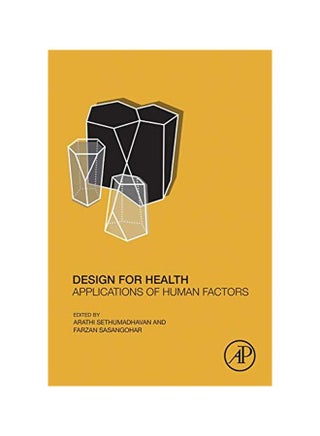| وصف الكتاب | Design for health: applications of human factors delves into critical and emergent issues in healthcare and patient safety and how the field of human factors and ergonomics play a role in this domain. The book uses the design for x (dfx) methodology to discuss a wide range of contexts, technologies, and population dependent criteria (x's) that must be considered in the design of a safe and usable healthcare ecosystem. Each chapter discusses a specific topic (e.G., mhealth, medical devices, emergency response, global health, etc.), reviews the concept, and presents a case study that demonstrates how human factors techniques and principles are utilized for the design, evaluation or improvements to specific tools, devices, and technologies (section 1), healthcare systems and environments (section 2), and applications to special populations (section 3). The book represents an essential resource for researchers in academia as well as practitioners in medical device industries, consumer it, and hospital settings. It covers a range of topics from medication reconciliation to self-care to the artificial heart |
| عن المؤلف | Arathi sethumadhavan is the head of user research of ethics & society in cloud+ai at microsoft, where she is responsible for bringing the perspectives of traditionally disempowered and neglected communities into shaping products. Key technology areas include ai across speech, computer vision, face recognition, and mixed reality. Prior to joining microsoft, she worked at medtronic, where she provided human factors leadership to multiple products in the cardiac rhythm and heart failure portfolio, including the world's smallest pacemaker. She has also spent several years investigating the implications of automation on air traffic controller performance and situation awareness. She has published numerous articles on a range of topics from patient safety, affective computing, and human-robot interaction, has delivered nearly 50 talks at national and international conferences, and been recognized by the american psychological foundation, the american psychological association, and the human factors and ergonomics society. Arathi has a phd in human factors psychology from texas tech university and an undergraduate degree in computer science from calicut university. Farzan sasangohar, phd, is an assistant professor of industrial and systems engineering as well as environmental and occupational health at texas a&m university. He is also a scientist and assistant professor at the houston methodist hospital's center for outcomes research and department of surgery. Prior to joining tamu, he worked as the manager of design research at td bank and as a research scientist at mit aeroastro. He has experience designing, developing, and evaluating human-systems in different domains such as aviation, process control, surface transportation, finance, and health care. Farzan has received a phd in mechanical and industrial engineering from the university of toronto in 2015, an sm in engineering systems from mit in 2011, a masc and bcs in systems design engineering and computer science from the university of waterloo in 2010 and 2007, and a ba in information technology from york university in 2009. He has authored more than 100 peer-reviewed publications and his research, teaching, and service have received national and international recognition. Farzan's research interests include remote health and performance monitoring, system resilience and safety, and user-centered design |
استرجاع مجاني وسهل
أفضل العروض




